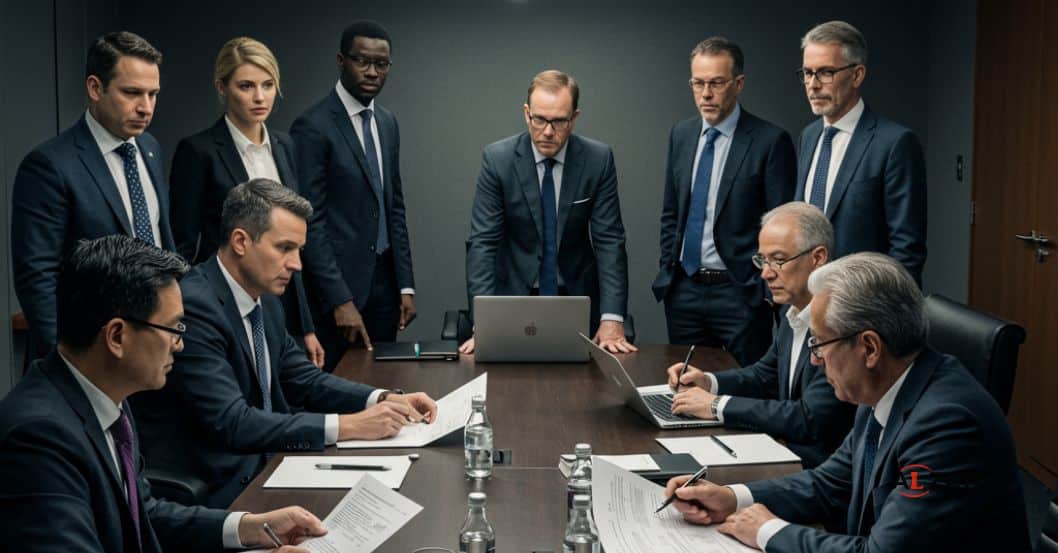The Intersection of Corporate Governance and Mergers & Acquisitions: An Expert Guide
Corporate governance and mergers & acquisitions (M&A) are deeply intertwined. Strong corporate governance is not merely a compliance issue; it is the foundational bedrock upon which successful M&A deals are built. A company’s governance framework—its rules, practices, and processes for directing and controlling the enterprise—directly impacts every stage of a transaction, from due diligence to post-merger integration. At Alzayat, Egypt’s First International Law Firm, we provide expert legal counsel to boards and executives, ensuring that sound governance principles guide these high-stakes transactions.
Why Good Governance is a Prerequisite for M&A Success
A robust governance structure signals a well-managed, transparent, and accountable organization. For a potential acquirer, this reduces perceived risk and increases confidence in the target company’s value. Conversely, weak governance, characterized by poor oversight or unclear decision-making processes, is a major red flag. It can conceal hidden liabilities and operational inefficiencies. Therefore, the strength of a company’s governance framework is a primary indicator of its viability as an M&A target or its capability as a strategic acquirer.
The Impact of Corporate Governance on Each M&A Stage
Effective governance is not an abstract concept; it has tangible effects on the practical steps of a merger or acquisition.
1. Due Diligence: Uncovering Governance Strengths and Weaknesses
The due diligence phase is a forensic examination of the target company. Here, strong corporate governance makes the process smoother and more transparent. Well-documented board minutes, clear internal controls, and a history of regulatory compliance allow the acquirer to assess the company accurately. In contrast, poor governance creates significant hurdles. A lack of transparency can hide legal disputes, regulatory fines, or problematic executive contracts. This makes it difficult to ascertain the true value and risk profile of the target, a critical aspect of navigating corporate governance and mergers & acquisitions.
2. Valuation and Negotiation: Pricing Governance Risk
The findings from due diligence directly influence valuation. A target company with strong governance often commands a higher valuation because it presents lower risk. Acquirers are willing to pay a premium for transparency and stability. On the other hand, a company with weak governance will likely see its valuation discounted. The acquirer must price in the potential costs of resolving hidden legal issues, implementing new compliance systems, or dealing with leadership instability. These factors become key leverage points during negotiation.
3. Post-Merger Integration (PMI): The Ultimate Test of Governance
The integration phase is where most M&A deals fail. Successfully merging two distinct corporate cultures, systems, and leadership teams is a monumental task. Strong, preexisting governance provides a clear roadmap for this process. It defines how the new, combined entity will be managed and who is accountable. As leading publications like the MIT Sloan Management Review often discuss, a failure to align governance structures post-merger can lead to cultural clashes, loss of key talent, and an ultimate failure to realize the deal’s strategic value.
The Role of the Board in M&A Oversight
The board of directors holds the ultimate fiduciary duty to ensure any M&A transaction serves the best interests of the company and its shareholders. Their role in overseeing corporate governance and mergers & acquisitions is paramount. This involves forming an independent committee to evaluate the deal, engaging external advisors (like lawyers and financial experts), and challenging management’s assumptions. As detailed in resources from institutions like Harvard Law School’s Program on Corporate Governance, active board oversight is the most important defense against value-destroying deals.

The board of directors plays a critical role in overseeing M&A deals to ensure they serve shareholder interests. Logo of Alzayat Law Firm.
Frequently Asked Questions
-
1. What is the biggest governance red flag during M&A due diligence?
- One of the biggest red flags is a lack of transparency or poorly maintained corporate records. If a company cannot provide clear board minutes, complete financial statements, or details on its ownership structure, it suggests that there may be hidden liabilities or that management is not accountable. This makes it impossible to conduct a reliable valuation.
-
2. How does a board of directors manage conflicts of interest in an M&A deal?
- The best practice is to form a special committee of independent directors who have no personal financial stake in the transaction. This committee is tasked with evaluating the deal objectively. Any director with a potential conflict of interest should recuse themselves from all discussions and votes related to the deal to ensure the board’s decision is untainted.
-
3. Can good corporate governance increase the final price of my company in a sale?
- Absolutely. Acquirers often pay a “governance premium” for companies that are well-managed, transparent, and have a clean legal and regulatory history. Strong governance reduces the acquirer’s risk, which translates directly into a higher, more confident valuation and a smoother, faster transaction process.
-
4. What is a “poison pill” in the context of M&A governance?
- A “poison pill” is a defensive strategy used by a target company’s board to thwart a hostile takeover. It works by making the company’s stock less attractive to the acquirer, often by allowing existing shareholders (excluding the acquirer) to buy additional shares at a discount. This dilutes the acquirer’s stake and makes the takeover more expensive. It is a powerful but controversial governance tool.
-
5. Why is integrating two different company cultures so important for M&A success?
- Culture dictates how employees work, communicate, and make decisions. If a conservative, hierarchical company acquires an innovative, flat-structured startup, the clash in cultures can lead to employee frustration, loss of key talent, and a breakdown in productivity. The success of corporate governance and mergers & acquisitions depends on a clear plan to merge these cultures effectively.
For expert legal guidance on your next M&A transaction, contact Alzayat, Egypt’s First International Law Firm, today.

